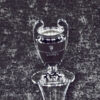Steve Harris gives an account of Werder Bremen’s Danish midfielder – Thomas Delaney
With the return of the Bundesliga this coming weekend after viewers made their judgements in the opening two gameweeks, many people are still asking the question: “Who will be the shining new star im herbst (the autumn season)?”
In Bremen in the North-Western part of Germany, the mood is more relaxed and they are not looking for new stars to lead them. Their star was signed this winter, in the form of Thomas Delaney. And here’s why, he could very well be the shining star in the Bundesliga this herbst.
But before we get to why, here’s a little backstory on the Dane.
In May 2017, FC Copenhagen was finally awarded the Danish Superliga title. The title had been virtually locked down since the Winter Break, and the club’s season had been on auto-pilot since a loss to Ajax in the Europe League, Round of 16.
So how do you celebrate a title that is more of a formality? The club had a plan: They would fly an FC Copenhagen painted helicopter into the stadium, land it in the middle of the pitch and present the Superliga trophy. What the audience didn’t know was who was flying the helicopter.
In the pilot’s seat was Thomas Delaney – the club’s former captain, club icon and talisman who had joined Werder Bremen over the winter.
Werder Bremen signed Thomas Delaney in the Summer Transfer window of 2016, yet the move wouldn’t materialize until 5 months later in the winter – the player was simply too important to FC Copenhagen. 5 months later, Thomas Delaney had been instrumental in the FC Copenhagen’s Champions League qualification and subsequent Europe League qualification. He’d scored screamers in the Champions League and managed a goal every third game in the Danish Superliga – all that as a box-to-box midfielder with significant defensive responsibilities.
After a lumpy start in Werder Bremen comprising four straight defeats, Thomas Delaney stepped onto the scene. On Matchday 21, he scored his first goal, a beautiful free kick curler in an away game against Mainz, despite suffering a facial fracture in the game.
This kickstarted a sequence in which Werder Bremen would not lose in 11 games. The highlight of the period came against Freiburg in which Thomas Delaney scored a hattrick. The three goals were symbolic for Delaney: The first was a first time, left foot finish from a low cross, the second a header from open play, and the third a header from a set piece.
That was arguably the highlight of the season on the pitch for the 25-year old, and this week, came the highlight off-pitch as a fantastic year was finished off by being named interim captain of Werder Bremen after 6 months and only 13 games at the club.
What makes Thomas Delayney special is his willingness to always improve his game and work on weak areas to a degree that few professional football players do. When Cristiano Ronaldo signed for Manchester United, he couldn’t head the ball. Today, it’s hard to find a better header of the ball in the game. The same goes for Thomas Delaney. At the start of his FC Copenhagen career, he would often stay back at corners. After all, a central midfielder standing 182 centimetres tall is not usually a large set piece threat.
From 2012 to 2015, he was a permanent feature in the FC Copenhagen team, yet he didn’t score more than three goals in a season. The trend continued at the start of the 2015/16 season, but towards the end of the season something changed: Thomas Delaney suddenly started scoring a lot of goals, netting three in the last seven league games. The goals came from set pieces and it was obvious, that Delaney had improved a weak part of his game – the rest is history and the player is now a recognized threat in the air from both set pieces and open play.
When you analyse this move, it is really quite impressive. Central midfielders are rarely known for their prowess at attacking set pieces. As a central midfielder you are less exposed to aerial duels than central defenders and attackers and as a result, your heading game is not a large focus area.
As a central midfielder, you don’t have to be a good header of the ball. But if you are and add 3-5 goals a season, your value sky-rockets. Whereas being more offensive to make more runs into the box makes you less defensively effective, being a threat from set pieces is basically “free”. It doesn’t subtract from your open play game, and it adds another goal threat from set pieces.
Another example is his ability with his weak foot. He is naturally left footed, but over the years, he has clearly trained his right foot to a degree where it can be hard to tell the difference and he is happy to shoot with both feet.
His professionalization is summed up on an interview with Deutsche Welle Sport:
You can go two directions when you sign for a new club. You can go for the money or you go to improve and that’s why I’m here. I didn’t come here to play relegation every year either. I came here to make an impact, to be an important player.
Needless to say, his professionalism on- and off the pitch, has quickly made him a fan favourite in Bremen. Nobody saw his set piece strength (or his pilot license) coming but from the evidence it is clear, that Thomas Delaney continuously works on becoming a better player. He is already a very good Bundesliga player. With half a Bundesliga season under his belt and more time to adjust, he is now set to become a prolific Bundesliga player.
At this time last year, Thomas Delaney was playing for a large club in a small country participating in the Champions League. At this time next year, it would be no great surprise to find him in a large club in a large country participating in the Champions League.
- Thomas Delaney – Modern Professional and Always Improving - September 4, 2017
























































